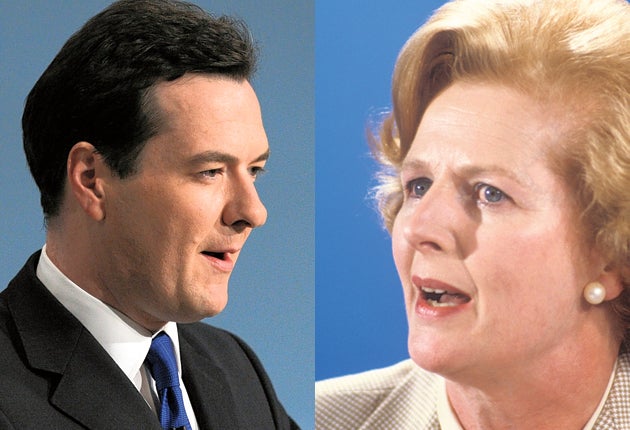Andrew Grice: Has Osborne just completed the Thatcherite revolution? (Not that he'd ever want to admit it)

Nick Clegg has repeatedly assured us that the spending cuts will not involve a repeat of the "slash and burn" approach of the Thatcher government in the 1980s, when poorer regions of Britain were left to sink or swim.
It is easier for a Liberal Democrat than a Conservative to criticise Margaret Thatcher. David Cameron's generation are "Thatcher's children" and, although the Prime Minister has distanced himself from her "no such thing as society" doctrine, this was probably more out of pragmatism and a desire to be voter-friendly than ideology. The Iron Lady, currently in hospital after failing to recover from flu, remains a revered figure in her own party.
For some Labour figures, the deep cuts announced by George Osborne on Wednesday make the austerity of the Thatcher era a tempting parallel. After all, a big factor in Mr Cameron's failure to win an overall majority at the May election was the feeling among some voters that his party was still the "same old Tories".
Like the Coalition, the Thatcher government tried to cut public spending at a time of low economic growth. But the parallel is not perfect. Thatcher's ministers sought to contain departmental budgets, but the welfare budget ballooned in the recession.
High unemployment was a more toxic issue than today, and the Thatcher government connived in GPs signing the jobless onto more generous long-term sickness benefits to massage down the unemployment statistics. Invalidity benefit (IB) became a form of early retirement for hundreds of thousands of people.
Welfare was left largely unreformed. Even Thatcherites baulked at it. Peter Lilley, a social security secretary, made speeches about benefit scroungers but, when faced with Treasury demands for big savings, used to ask which one million people it would like him to deprive of £1,000 to save £1bn.
This is one area where the Coalition is trying to complete Lady Thatcher's unfinished business. A successor to IB, employment and support allowance (ESA), is one of the main targets in the Government's sights. Mr Osborne announced a controversial one-year time limit for one million claimants of ESA, who will lose an estimated £50 a week.
Arguably, the present Government is looking at savings from the other end of the telescope to Thatcher's. By announcing £18bn of welfare cuts, Mr Osborne took some pressure off other departments, such as the schools budget. Yet the planned savings on benefits could prove illusory without the private sector recovery the Chancellor is banking on – literally.
There are other areas where the Coalition is trying to go beyond Lady Thatcher. Universal child benefit survived her revolution but it will be ended in 2013 for families with a top-rate taxpayer.
In 1984, Keith Joseph, the Thatcherite education secretary, was forced to abandon a plan to bring in university tuition fees, which would have hurt the Tories' natural middle-class supporters. Sound familiar? Mr Cameron risks a similar backlash as his administration prepares to lift the cap on fees.
Today's ministers do not deny the claim by Alan Johnson, the shadow Chancellor, that their cuts will go deeper than those achieved by Lady Thatcher. Yet they point out that Alistair Darling, the then Labour chancellor, admitted on the day of his March Budget that his plan to halve the deficit over four years would be "deeper and tougher" than that of the Thatcher government. So there may be limited mileage for Labour in playing the Thatcher card. And most voters accept the £155bn deficit must be tackled.
A more productive line of attack might be to accuse the Coalition of wanting to slim the state for the same ideological reasons which motivated Lady Thatcher. Mr Cameron and Mr Clegg are very sensitive to the charge that their cuts are motivated by ideological zeal, insisting they are a grim necessity. "We are doing this because we need to, not because we want to," is their message (and, by the way, the deficit is Labour's fault). Tory MPs are under strict orders from party managers not to look as though they are relishing the cuts ("same old Tories" again).
Cameron and Clegg allies stress that today's circumstances are different. The Thatcher revolution involved allowing a restructuring in industries like coal mining which previously provided a job for life, and breaking the power of the trade unions to obstruct change. Although state-owned industries were privatised, the restructuring did not really extend to government departments.
The Coalition has no appetite for another assault on the unions, reacting coolly to a call by the CBI for a law to curb further their ability to strike. For ministers, that business was finished in the 1980s and would look punitive in the current climate.
It is often forgotten that "Thatcherism" developed slowly. Her revolution did not begin in 1979. Her major reforms came in her second and third terms – a lesson the Tories took on board as they drew up a blueprint for power in opposition. They resolved to "hit the ground running" rather than waste their early years, something which both Lady Thatcher and Tony Blair regretted.
In the end, the Tories and Liberal Democrats judged that the scale of the deficit meant delay was not an option. As one minister put it, in a way that Lady Thatcher would be proud of: "We are not looking for a revolution. We are doing the cuts because there is no alternative."

Join our commenting forum
Join thought-provoking conversations, follow other Independent readers and see their replies